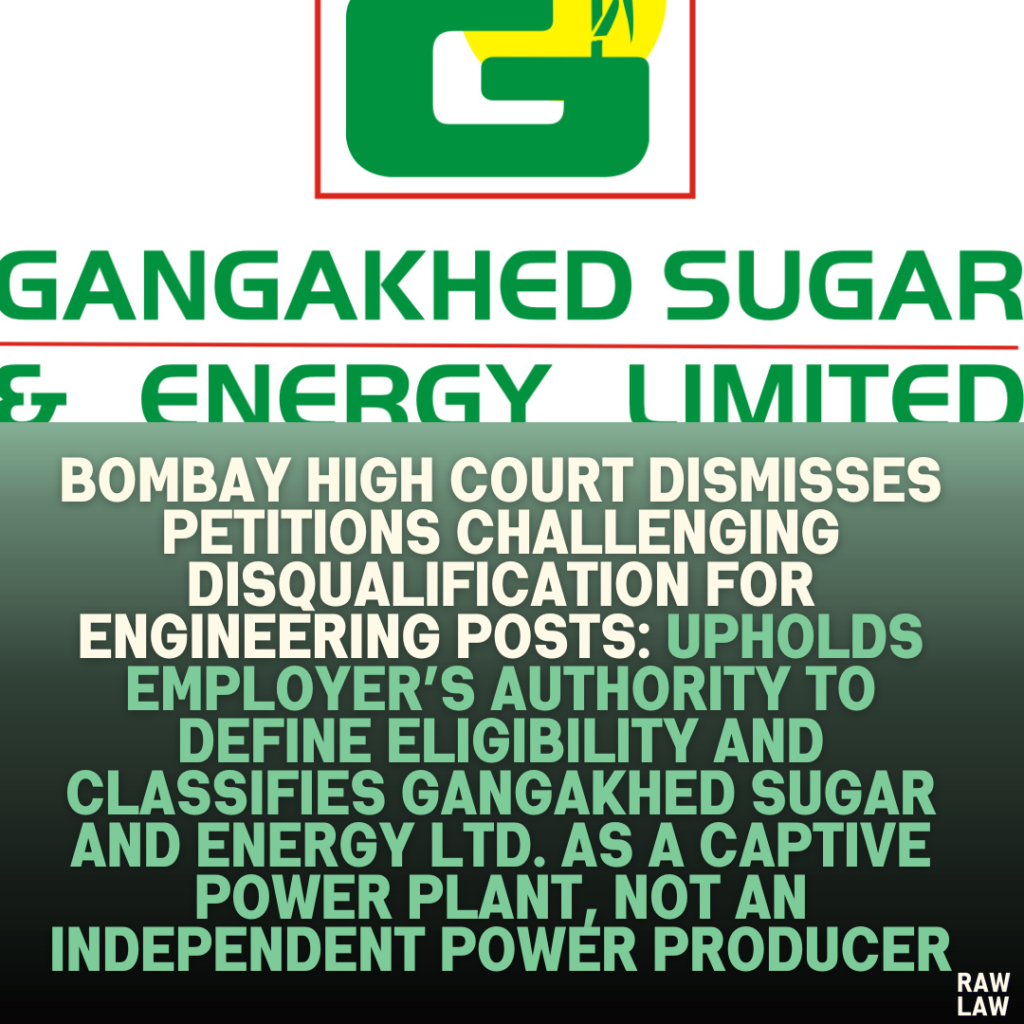Court’s Decision:
The Bombay High Court dismissed three writ petitions filed by candidates who were declared ineligible for the positions of Additional Executive Engineer and Deputy Executive Engineer by Maharashtra State Power Generation Company Limited (MAHAGENCO). The court held that the employer is the best judge to determine the qualifications and experience required for a post. It further clarified that judicial intervention in such decisions is limited unless arbitrariness or illegality is demonstrated.
Facts of the Case:
- Advertisement: MAHAGENCO issued an advertisement in 2022 for various engineering posts, including Additional Executive Engineer and Deputy Executive Engineer. The advertisement required specific experience in Power Generation Companies, including Independent Power Producers (IPPs).
- Petitioners’ Experience: The petitioners claimed eligibility based on their experience at Gangakhed Sugar and Energy Ltd., arguing that the entity qualifies as an IPP.
- Expert Committee’s Decision: The company’s expert committee reviewed the documents and declared the petitioners ineligible, categorizing Gangakhed Sugar and Energy Ltd. as a Captive Power Plant (CPP) rather than an IPP.
- Representation Rejected: The petitioners filed representations challenging this decision, which were reviewed and rejected by the respondents.
- Legal Challenge: Aggrieved, the petitioners approached the High Court, seeking to overturn the decision and direct their consideration for the posts.
Issues:
- Primary Issue: Can the petitioners’ experience with Gangakhed Sugar and Energy Ltd. qualify under the advertisement’s requirement for experience in an IPP?
- Secondary Issue: Does the employer have the final authority to interpret qualifications and determine eligibility under the advertisement?
Petitioner’s Arguments:
- Classification of Gangakhed Sugar and Energy Ltd.: The petitioners argued that Gangakhed Sugar and Energy Ltd. qualifies as an IPP under the statutory definition in the Maharashtra Electricity Duty Act, 2016.
- Ambiguity in Advertisement: They contended that the advertisement lacked clarity regarding the definition of IPP. In cases of ambiguity, courts must favor the candidate.
- Precedents: Petitioners cited prior cases where similar experience was accepted, pointing to inconsistency in applying criteria.
- Statutory Guidelines: They claimed that the statutory definitions of IPP and Captive Power Plant (CPP) must guide the respondents’ decision.
Respondent’s Arguments:
- Nature of Gangakhed Sugar and Energy Ltd.: The respondents emphasized that Gangakhed Sugar and Energy Ltd. is primarily a sugar factory, generating electricity only as a secondary activity. This classifies it as a CPP, which was explicitly excluded in the advertisement.
- Employer’s Discretion: They argued that the expert committee’s decision is final unless it is arbitrary or illegal. The advertisement clearly outlined the eligibility requirements, and the decision was consistent with these terms.
- Expert Committee Findings: The respondents pointed out that the expert committee analyzed the petitioners’ documents and found that their experience did not meet the eligibility criteria.
- Prior Selections Not Binding: Previous instances of employment under different advertisements with varying criteria cannot bind the employer in this case.
Analysis of the Law:
- Statutory Definitions vs. Employer’s Criteria:
- The petitioners relied on statutory definitions of IPP, CPP, and Co-generation under the Maharashtra Electricity Duty Act, 2016.
- The court held that the advertisement did not explicitly adopt these statutory definitions. Therefore, the employer’s interpretation of IPP, tailored to meet its requirements, takes precedence.
- Judicial Review of Eligibility:
- The court reiterated principles established by the Supreme Court, emphasizing that employers are best suited to determine essential and desirable qualifications for their posts.
- Judicial interference is restricted to cases of proven arbitrariness or violations of statutory rules.
- Advertisement Clarity:
- The court found no ambiguity in the advertisement, which explicitly excluded experience from CPPs.
Precedent Analysis:
- Maharashtra Public Service Commission v. Sandeep Shriram Warade: The Supreme Court held that eligibility criteria and qualifications for a post are the employer’s prerogative, and courts cannot re-write them.
- Tajvir Singh Sodhi v. State of Jammu and Kashmir: Courts should avoid substituting their judgment for that of expert committees unless there is arbitrariness or illegality.
- Ritu Bhatia v. Ministry of Civil Supplies: Statutory definitions may not automatically apply to employment advertisements unless explicitly adopted.
- Ankita Thakur v. H.P. Staff Selection Commission: In cases of ambiguity, the benefit should go to candidates. However, no such ambiguity was found here.
Court’s Reasoning:
- Gangakhed Sugar and Energy Ltd.’s Classification:
- The court upheld the expert committee’s finding that the company is a CPP, not an IPP. Electricity generation was incidental to its primary business of sugar production.
- Employer’s Authority:
- The employer’s interpretation of IPP for eligibility criteria was final and not subject to judicial reinterpretation.
- Role of Expert Committees:
- The expert committee’s role in scrutinizing applications and determining eligibility was decisive. Courts cannot override such decisions without strong evidence of arbitrariness.
- No Ambiguity in Advertisement:
- The court found that the advertisement was clear in requiring experience from IPPs and explicitly excluding CPPs.
Conclusion:
The High Court dismissed the writ petitions, affirming:
- The employer’s discretion to interpret and apply eligibility criteria in employment advertisements.
- The expert committee’s decision to classify Gangakhed Sugar and Energy Ltd. as a CPP and exclude it from IPP experience requirements.
- Judicial review in such cases is limited and does not extend to re-evaluating expert decisions.
Implications:
- For Employers: The judgment reinforces their authority to define and interpret qualifications for posts.
- For Candidates: It underscores the need for candidates to adhere strictly to advertisement terms without assuming broader interpretations.
- For Courts: The ruling limits judicial intervention in employment eligibility decisions unless arbitrariness or illegality is proven.



